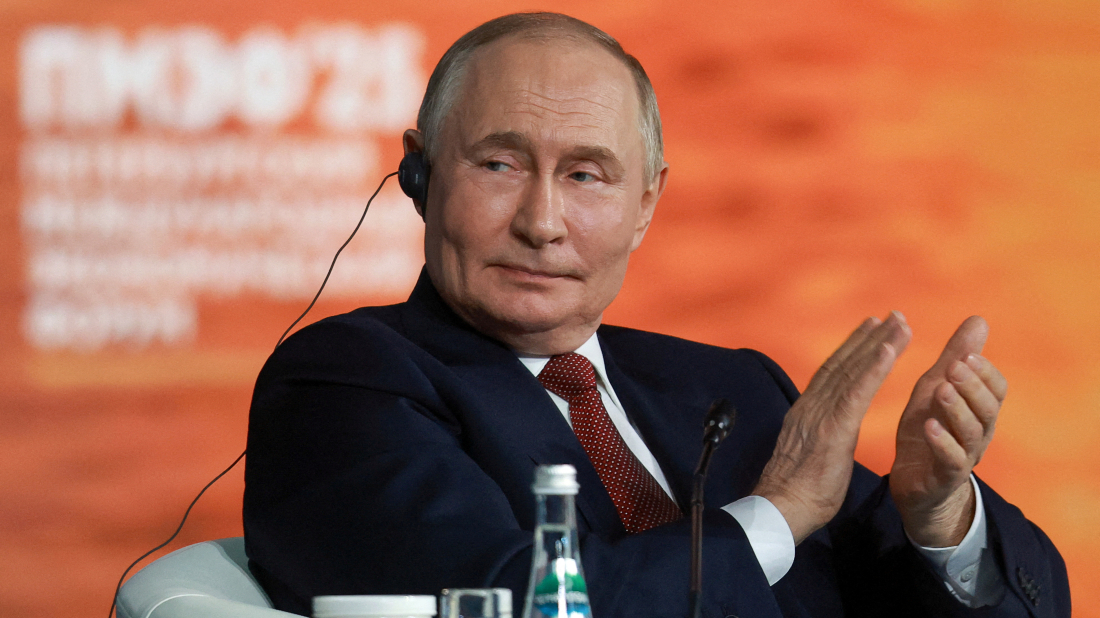Ukraine imposes new sanctions targeting Russian maritime and defence supply chains
Ukraine’s President Volodymyr Zelenskyy has approved new sanctions targeting Russian maritime operators, defence-linked companies and individuals co...

Russian President Vladimir Putin used the platform of the 2025 St. Petersburg International Economic Forum to reinforce his vision of Ukraine as a neutral state aligned with Russia, warn of rising global conflict potential, and outline conditions for foreign firms to return to Russia.
Russian President Vladimir Putin used the platform of the 2025 St. Petersburg International Economic Forum (SPIEF) to reinforce his long-standing vision of Ukraine as a historically and culturally inseparable part of Russia. He reiterated his demand that Ukraine adopt a neutral, non-aligned status as a precondition for peace and hinted at potential territorial advances, including the strategic northeastern city of Sumy. In the same address, Putin raised alarm over the mounting risk of global conflict, citing instability in the Middle East and growing tensions around Iran’s nuclear programme as key flashpoints.
Beyond geopolitics, Putin also used the forum to deliver a clear message to the global business community: foreign companies seeking to return to Russia will be allowed back only under conditions favourable to domestic industry. He emphasised that investment is welcome, but only from partners who demonstrate reliability and respect Russia’s national interests. The remarks reflect a broader strategy to assert economic sovereignty while navigating the realities of a war-driven economy and increasing international isolation.
On Ukraine and territorial control
In his most direct comments to date, Putin claimed “in that sense the whole of Ukraine is ours,” referring to his view that Russians and Ukrainians are “one people.” While he denied seeking Ukraine’s capitulation or denying its sovereignty, he underscored that Ukraine's original 1991 declaration of independence called for a neutral, non-aligned status — a condition he said must be respected if there is to be peace.
Putin said that Russian forces are carving out a buffer zone in Ukraine’s Sumy region to protect Russian territory and did not rule out a potential advance on the regional capital. “We don't have the task of taking it, but in principle I don't rule it out,” he said, adding that Russian troops currently control a zone 8–12 km deep in the area.
Russia now claims control over about 20% of Ukrainian territory, including Crimea, nearly all of Luhansk, and substantial parts of Donetsk, Zaporizhzhia, and Kherson, with partial control in several other regions.
On global conflict and nuclear risks
Putin warned that the world is facing growing conflict potential, citing flashpoints including Ukraine, the Iran-Israel crisis, and instability around Iran’s nuclear facilities, where Russian specialists are constructing reactors. He described the situation as “disturbing” and urged for peaceful solutions across regions.
On military cooperation and modernisation
Putin confirmed plans to deepen military-technical cooperation with allied nations, including joint arms development and training, while also continuing to modernise Russia’s domestic armed forces with cutting-edge technology and infrastructure.
On foreign investment and seized assets
With Russia’s economy facing slowing growth despite years of military-driven expansion, Moscow is now looking to foreign capital, but with conditions. Prosecutor General Igor Krasnov said returning companies would be carefully monitored to ensure benefits to Russian firms.
Putin acknowledged the importance of investment but warned that companies which exited for political reasons were “unreliable partners.” He said Russian businesses must be guaranteed better terms than returning Western competitors.
Western corporate presence at SPIEF was minimal, and Finance Minister Anton Siluanov confirmed that no formal applications for return had yet been filed, though he claimed foreign interest is growing.
Quentin Griffiths, co-founder of online fashion retailer ASOS, has died in Pattaya, Thailand, after falling from the 17th floor of a condominium on 9 February, Thai police confirmed.
Ukraine’s National Paralympic Committee has announced it will boycott the opening ceremony of the Milano Cortina 2026 Paralympics in Verona on 6 March, citing the International Paralympic Committee’s decision to allow some Russian and Belarusian athletes to compete under their national flags.
Eric Dane, the actor best known for his roles in 'Grey’s Anatomy' and 'Euphoria', died on Thursday, at the age of 53 after a battle with amyotrophic lateral sclerosis (ALS). His family confirmed his death after what they described as a “courageous battle” with ALS.
An Austrian climber has been convicted of gross negligent manslaughter after his girlfriend died from hypothermia while climbing Austria’s highest peak, the Grossglockner, in January 2025.
President Donald Trump said on Saturday (21 February) that he will raise temporary tariffs on nearly all U.S. imports from 10% to 15%, the maximum allowed under the law, after the Supreme Court struck down his previous tariff program.
Ukraine’s President Volodymyr Zelenskyy has approved new sanctions targeting Russian maritime operators, defence-linked companies and individuals connected to Moscow’s military and energy sectors, according to official decrees issued on Saturday.
Divers have recovered the bodies of seven Chinese tourists and a Russian driver after their minibus broke through the ice of Lake Baikal in Russia, authorities said.
A technical fault in the helium system of NASA’s next-generation moon rocket was announced on Saturday, ruling out the planned March launch window for the Artemis II mission.
President Donald Trump said on Saturday (21 February) that he will raise temporary tariffs on nearly all U.S. imports from 10% to 15%, the maximum allowed under the law, after the Supreme Court struck down his previous tariff program.
Germany's ruling conservatives on Saturday (21 February) passed a motion to ban social media use for under 14s and introduce more stringent digital verification checks for teenagers, building momentum for such limits in Germany and elsewhere in Europe.
You can download the AnewZ application from Play Store and the App Store.

What is your opinion on this topic?
Leave the first comment